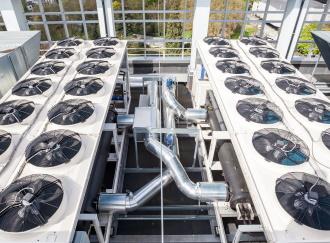HVAC System Basics from the Best Commercial HVAC Contractors in St. Louis
HVAC (heating, ventilation, and air conditioning) systems are varied, especially when it comes to commercial HVAC systems. You have everything from the single-unit window air conditioners, to multi-story complex A/C systems for multi-tenant office buildings.
If you own a business, a welcoming, even temperature can make customers instantly feel comfortable. Even if you’re not a customer-facing business, you still need a good HVAC system to keep employees cool, happy, and productive. Some businesses even require temperatures to be maintained for health, safety, or legal reasons.
If you’re planning on a new commercial HVAC installation for your business, there are three main types you can consider. Meyer Heating & Air can be your preferred commercial HVAC contractor, as we perform commercial HVAC installation and HVAC maintenance, and have been for years. Below, we’ll outline the three most common types of commercial HVAC systems on the market today and discuss the pros and cons of each.
Single Split HVAC Systems
Single split HVAC systems are popular because they’re relatively small and inexpensive. Single split systems typically include an air conditioner that cools the refrigerant. Most systems include a furnace that converts the refrigerant. An evaporator coil then circulates the air through your building.
Single split HVAC systems are self-contained and have their own thermostat or panel. Every unit has its own indoor unit and corresponding external unit.
Because of their relative simplicity, single split HVACs are cheap to implement and install. Another benefit is if one unit stops functioning for any reason, you can still rely on the other units. On the other hand, they tend to require more space and ductwork.
Multi Split HVAC Systems
Multi split HVAC systems are quite similar to single split HVACs, but with one important difference. Where single split systems pair an external unit with each internal unit, you can connect up to nine internal units to a single outdoor unit.
For larger spaces, a multi split HVAC system actually takes up less room as you no longer need to have so many single split units with pipes leading to their corresponding external unit. Multi split is typically marginally more expensive to install at first, but significantly cheaper to run.
Multi split systems have the benefit of being able to pump heat from warm areas to cooler ones. This makes running the system cheap and also tends to result in a more even temperature throughout the building.
Variable HVAC Systems
Variable HVAC systems are also known as variable refrigerant flow (VFR) systems. These types of HVAC systems are fast to install and are easy to use. VFR is particularly interesting because it uses refrigerant as the method for cooling and heating.
A heat pump variable HVAC system is only able to provide either heating or cooling—it can’t do both at the same time. This means it’s a good option for large spaces. A better option for a building that has many smaller rooms is a heat recovery system, which can provide cooling and heating at the same time.
The refrigerant is conditioned by a single outdoor condensing unit and transported to multiple indoor units in different rooms. Because of the efficiency savings, you can often see over 50% improvement in utility bills by using a VFR system. VFR systems don’t just use simple on/off logic like a traditional HVAC system; they use more sophisticated calculations to operate the compressor at exactly the right level to keep every room at their chosen temperatures.
Choosing an HVAC System for your Business
Usually, HVAC systems that have a higher up-front cost perform better over the long term and offer significant savings. But if you only need to heat or cool a few small areas, single split HVAC is perfectly viable. If you want the most economical HVAC system over the long run, the VFR systems are impressive.
To discuss your HVAC needs, please get in touch with Meyer Heating & Air. We have a long history of installing and maintaining air conditioning systems in St. Louis, and we’ll be more than happy to discuss what we think are the best options for your particular needs and show you how you can save money by making the right choice.
We also want to be your HVAC maintenance company in St. Louis for all your ongoing maintenance needs. Keeping your new commercial air conditioning system in top shape is key to getting the best from your HVAC and ensuring it runs economically and lasts for decades. Give us a call today, or request a service appointment online.


